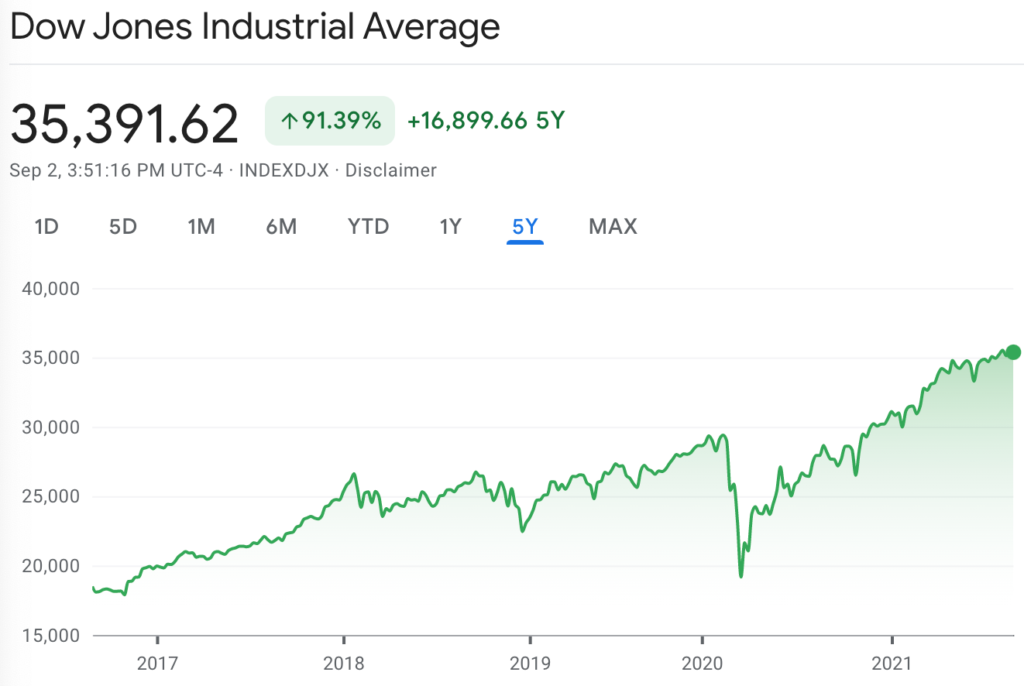This post reveals why the rich get richer (even during a pandemic), the dangers of wealth disparity, and how I’m using this knowledge.

This post may contain affiliate links.
The Covid-19 pandemic threw the United States economy for a loop, just like it did for the global economy. Many factors contributed to job losses like sickness, death, and the rise and fall of entire industries. For much of our country, this led to pay cuts, unemployment, loss of benefits, and reliance on governmental aid. But for the lucky part of society with office work or in essential industries, life went on as usual or switched to the virtual world.
While there were clearly people who lost out financially during the coronavirus pandemic last year, there were some who had startling increases in wealth as well. A recent article from MSN spelled it out plainly: “US wealth grew by $19 trillion during the pandemic.”
Economists Nancy Vanden Houten and Gregory Daco concluded 3 things about the wealth changes:
- Almost all the gains came from existing assets
- The top 1% had their wealth increase 23%
- The bottom quartile had their wealth increase only 2.5%
How did this happen? There are a few things at play here that are specific to the pandemic, but also a number of constant factors in our society that favor rich people. I’d like to discuss a few of these below.
Here are some of the important factors that favor the rich:
- Compound interest from real estate and stocks
- Our credit system
- Familial insurance
Compound interest: Assets birth more assets
I love quoting Einstein, who famously said that “compound interest is the eighth wonder of the world.” But compound interest doesn’t work on a bank account that has nothing in it.
Basically: you need assets to make more assets.
Unfortunately, more than half of U.S. households have either no savings or only 3 months of emergency savings. It’s incredibly difficult to get ahead when a single flat tire or health care bill can wipe out your entire bank account.
In contrast, the more money you have in the bank, the easier it is to take advantage of all the wonders of investment.
For example, let’s say you’re lucky enough to save $1 million in your brokerage accounts and have it invested in the stock market.
In an average year, you’ll make $80,000 (8%) via passive growth of your stocks. That’s over $10,000 more than the average American income in 2019. The next year, you’ll make $86,400 due to compounding. The next year you’ll make around $93,000, and so on. Once the asset snowball starts growing, it’s truly powerful.
Below, let’s take a quick look at the two major forms of asset accumulation for the rich: real estate and stocks. These two asset classes have gone crazy during the pandemic and brought increased riches to wealthy families.
Real Estate
If you’ve been looking for a new home or if you’re into real estate investment like me, you may have noticed a strange phenomenon during the pandemic: home prices skyrocketed. In fact, data shows home prices in the US increased a massive 18% in 2020. I’ve discussed the reasons for this before, and my views are roughly in line with the professionals on this (supply and demand).
It stands to reason that a big part of the massive increase in wealth of the top 1% during the pandemic is from real estate.
After all, we know that the truly wealthy traditionally hold the majority of their wealth in business and real estate:


While it’s not immediately obvious that compound interest affects real estate, I believe it does. The truly savvy owners of real estate utilize the equity in their homes to make more money.
Just as I purchased the majority of my real estate portfolio with a HELOC, the rich are able to tap the equity in their real estate to invest. This leads to compounding over time just as it does with stocks.
Stocks
If you were lucky enough to have stocks invested during the pandemic (and didn’t sell at the bottom), you’ve also done really well.


Over the last 5 years, the Dow Jones Industrial Average rose 92%. From March 2020, which was the depths of the Covid-19 induced bear market, stocks have risen a startling 85%.
Compound interest and growth from the stock market has been a huge wealth magnifier for the rich during the pandemic.
But to take advantage of a rising market, you need assets that are already invested in the market. You also need free cash to withstand downturns in the economy (so you don’t sell stocks when the market is low).
If you have enough assets, you can even pump more cash into the market when it’s low, magnifying the effect of the rebound on your portfolio.
Our credit system
Lending standards, credit ratings, and our credit system overall are also big factors that help the rich get richer.
I’ve previously done a deep dive into the way the credit rating system works in the US: The Fastest Way to Improve Your Credit Score
When you look at the way all these elements interact, it’s clear to see how this favors the rich.
You get the best credit score if you have:
- On time payments
- Lots of available credit (while only using a small amount)
- A long history of credit
- A good mix of long term and short term credit
- Not too many recent credit checks
All of these factors are easier to achieve if you already have wealth.
The ramifications of a low credit score are severe. If you have a low score, it costs you much more money to access credit. Everything from a car loan to a mortgage will be much more expensive. This can make it even harder to have the disposable income to save money and build better credit.
The creditors will claim that the credit score is an accurate way of evaluating the riskiness of lending. They’re probably right. But that doesn’t change the fact that it’s a system that favors the wealthy.
Familial insurance
Finally, the rich have enough money to provide their kids with a special form of insurance: Familial Insurance.
I discussed the concept of familial insurance in this post: Inheritance and Intergenerational wealth transfer.
Basically, if you have familial insurance, you have the assurance that if things go financially wrong, you can depend on your family to bail you out. I’m not just talking about getting bailed out of jail. I’m talking about loans from parents to help with everything from business risks, real estate, and car trouble.
As the Federal Reserve found in their study, the existence of familial insurance allows kids to take more financial risk to get higher returns.
You can see this at play in your everyday life. How many friends do you know that have great ideas for inventions or businesses? I bet you that most of your friends can’t pursue these ideas because they are reliant on their job to cover their expenses. They can’t take the risk to quit their jobs and pursue their dreams, as lucrative as their idea might be.
On the other hand, having rich, successful parents was essential in allowing Jeff Bezos, Bill Gates, and Mark Zuckerberg start their companies.
Even now, after years of saving and investing, I still feel handcuffed to my job. Because of our high expenses, I can’t afford to just quit my job and pursue my passion projects (yet). I’m certain that if done right, real estate could easily eclipse the salary from my job as a surgeon. But it’s very tough for me to risk the reliable income from my day job when I don’t have familial wealth to fall back on.
Wealth disparity is bad
Finally, let’s take a moment to address the problem of wealth disparity. There’s good evidence that severe wealth disparity is bad for society. It seems to lead to worse general health, happiness, and economic growth. For example, economic inequality is implicated in the fall of major civilizations like the Roman Empire.
But when philosophers think about what’s necessary to solve wealth disparity, it’s not a pretty picture. Policy studies suggest that you have to sever (or weaken) the connection between money and these elements:
- Political connections
- Societal control
- Economic opportunity
You also have to spread the gains of corporations more equally amongst all the workers (not just to the CEOs). This would reduce income inequality and hopefully the wealth gap.
Another possible solution is to change our tax laws. You could institute a big wealth tax to redistribute money from wealthy individuals to the rest of society. You can increase tax rates at the higher income levels, or just take a few cents of every dollar earned beyond a certain amount. Or finally, you could eliminate the preferential treatment given to capital gains.
It’s more than just reducing the concentration of wealth at the top. You also have to carefully distribute the money to the rest of the population. This is incredibly tricky to do in a way that both breaks the cycle of poverty and adequately incentivizes innovation and productivity.
Call me cynical, but I just don’t see much change happening to any of these areas in the near future. Regardless of which of the political parties you favor, you’d have to admit that our federal government has been remarkably ineffective at making foundational changes to income distribution in recent years. I just don’t see the billionaire class like Amazon’s Jeff Bezos going away anytime soon.
I’m choosing financial freedom
To be brutally honest, since wealth inequality does exist in our society, I’d prefer to be on the wealthier side of the equation.
I experienced the poorer end of the spectrum as a kid and have the scars to show for it. A million things could have gone wrong in my life, leading to the perpetuation of financial hardship for my family. I’m very lucky and appreciative that things have gone the other way.
If things proceed as planned, we will amass enough passive income from stocks and real estate to retire within the next 10 years. This will help set our family on a path of financial stability and prosperity for generations to come.
And although I worry about the negative effects of generational wealth, I’ll be damned if I’m going to risk the known negative effects of poverty for my kids.
Honestly, worrying about the ill effects of money on kids is such a privileged worry in the first place.
Are you unsure of how to start down the road of wealth building? Take a look at this post: How to Save, Invest, and Become Rich.
Conclusion
The rich get richer by having enough assets in both stocks and real estate to take advantage of the magic of compound interest. Societal pillars like our credit system also favor the rich. Finally, family assets allow for a form of “familial insurance,” that allows the next generation to take bigger risks (and have bigger gains).
These all perpetuate wealth and lead to generational wealth.
If you got this far in the article, you care about money and how it affects society.
I agree that in many ways it’s easier to just do your own thing and ignore the world of the super rich. But as we discussed above, the wealthy are likely to use their wealth to stack the deck in their favor. Since I come from a background of financial hardship, I’m committed to changing the story for my own family.
So I’ll continue to study the techniques of the rich. Until our society becomes more balanced with less wealth disparity, I’ll do my best to end up on the wealthy side of the spectrum.
Did I convince you? Do you disagree? Comment below and please subscribe to my newsletter for weekly posts just like this!
Perhaps you’re more of a Facebook type?
Are you a physician, spouse, or professional and you’re interested in using Real Estate to gain financial freedom? Join us in our Facebook group and accelerate your journey!


Want to support the blog?
- Join our investor club at Cereus Real Estate
- Visit my Recommendations page
- Check out my wife’s food blog: Eat Dessert First
- Stay at our luxury short term rentals
- Check out my TikTok channel
- Follow me on Instagram
- Follow me on YouTube
- Contact me with questions


2 comments
The compounding over time really is the most powerful force.
$3 million in 2012 invested in the S&P 500 is worth $10 million today! Not bad.
I never got the guts to use a HELOC to invest in more property with leverage. That’s the downside to retiring in 2012, makes you more conservative.
But I’m not complaining since the time won back since 2012 has been well worth it!
If markets continue, working may no longer be necessary for many investors!
Agree! Existing assets + compounding + time = wealth.